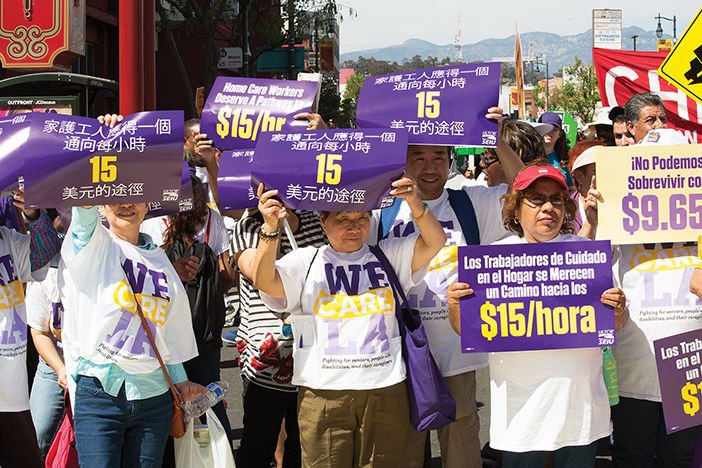After months of both public debate and behind of the scene lobbying, the Los Angeles City Council on May 19 approved an unprecedented plan to raise the city’s minimum wage to $15 per hour by 2020 from the current base wage of $9 per hour.
The raise will make L.A. the largest U.S. city to adopt a significant minimum-wage hike. As many as 800,000 local workers would be affected.
The council’s vote was 14 to 1 to have City Attorney Mike Feur prepare an ordinance to implement the wage hike, with a final, mostly ceremonial, vote taking place in June. And Mayor Eric Garcetti agreed to sign the pay increase, making it a law.
The plan calls for the first wage rise on July 1, 2016, to $10.50 per hour, with yearly increases through 2020. For businesses with 25 or fewer employees, there would be a delay of one year.
Councilman Paul Krekorian helped craft the city’s plan. “Make no mistake, today the City of Los Angles, the second-biggest city in the nation, is leading the nation” in raising the pay of the working poor, he told the Los Angeles Times.
The former head of the Los Angeles County Federation of Labor, Maria Elena Durazo, said the decision by the city council was part of a social justice movement sweeping across the United States to alleviate poverty. She called it a “very big” victory that will spur other municipalities to do the same.
There was still opposition to the measure, however.
The council’s action could “make it impossible for entire industries to do business in Los Angeles,” said Councilman Mitchell Englander, who cast the only opposing vote in a statement. “The very last thing that we should be doing as a city is creating a competitive disadvantage for our businesses with those in neighboring cities.”
The council’s harshest criticism was from business groups. They warned that the wage hike would force employers to either move out of L.A. or, at the very least, to lay off workers and pass the new labor costs onto consumers.
“It’s simple math,” pointed out Ruben Gonzalez, senior vice president for public policy and political affairs of the Los Angeles Area Chamber of Commerce. “There is simply not enough room, enough margin in these businesses to absorb a 50 percent increase in labor costs over a short period of time.”
‘Companies can afford it’
Rick Caruso is one of Los Angeles’ leading businessmen as well as philanthropists. The attorney developed The Grove in the Fairfax District of Los Angeles along with The Americana at Brand in Glendale. He’s also a major benefactor of the Caruso Catholic Center and Our Savior Parish Church on the campus of USC, his alma mater. And in 1991, he and his wife, Tina, created the Caruso Family Foundation.
“I believe in a ‘living wage,’” he told The Tidings last October. “I think companies can afford it. I think companies should get involved and debate it and craft it. I’m very sensitive to job creation. I don’t think it’s going to affect job creation.
“But I think we’ve got an obligation to pay people a wage that they can actually live on and provide for. We do it in my company and we do it voluntarily. And I’m very proud of that.”
Caruso doesn’t buy the argument that raising the minimum wage will necessarily drive companies to other cities and states. Nor does he believe, for the most part, raising worker’s pay will only raise prices or cut employees.
“And I think there is a fairness test that needs to be applied, and [raising the minimum wage] passes the fairness test,” he said. “I think it’s lazy to make an argument that because you’re going to raise the minimum wage you’re going to lose jobs.”
Moreover, he says a number of CEOs of Fortune 500 companies have privately praised him for supporting a raise hike for the nation’s working poor.
“I think a lot of people believe it, but they’re scared to say it,” he pointed out. “And you’re particularly scared to say it when you’re a public company and you’re worried about the shareholders getting upset at you.”
Even last fall, Caruso maintained that the pendulum had finally swung in favor of working stiffs getting a real living wage. He predicted, “I think it’s going to happen; it’s just a question of what’s the amount going to be.”

